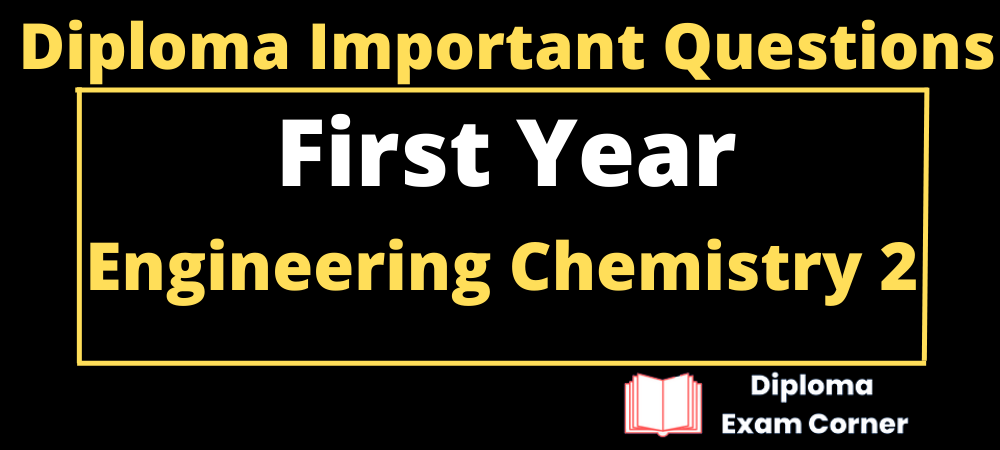Diploma Engineering Chemistry 2 Important Questions
Dear Students
We have added Diploma Engineering Chemistry 2 Important Questions for all Units You can download Diploma Engineering Chemistry 2 important questions as pdf.
Diploma Engineering Chemistry 2 syllabus
RATIONALE:
- The subject Engineering Chemistry – II develop basic understanding about electrochemistry, energy resources, corrosion, methods of prevention of corrosion and its organic coatings.
- Energy chemistry explains various aspects with regard to fuels, combustion and rocket propellants.
- Prime importance is given to technology of water, its analysis of few parameters like pH, TDS, Hardness, dissolved chlorine, e-coli etc.
- Environmental chemistry explains environmental pollution, solid waste management and green chemistry.
OBJECTIVES:
The objective of this Course is to make the student:
1. To acquire knowledge about electro chemistry, electro chemical cell.
2. To know about corrosion and prevention.
3. To acquire knowledge about fuels, combustion of fuels and rocket propellants.
4. To know about water and its analysis.
5. To acquire knowledge about Environmental Chemistry.
Unit 1 Electro Chemistry
1.1 Electrochemistry-I
Electronic concept of oxidation and reduction – Faradays’ laws of electrolysis – simple problems – electrolytes – nonelectrolytes – electrolysis – definition – Mechanism – Industrial applications of Electrolysis – electroplating chromeplating.
1.2 Electrochemical cell
Electrochemical cell – Definition Galvanic cell – Formation of Daniel cell –
Electrochemical series – Definition – significance.
1.3 Energy Sources
Primary Battery – Secondary Battery – Definition and example – cell – Construction, working principle and Uses of Lead acid – Storage battery – Lithium ion – battery – Solar Cell – Definition – working principle.
Unit – 2 CHEMISTRY OF CORROSION AND PREVENTION
2.1 Corrosion
Definition – types of corrosion – theories of corrosion – galvanic cell formation theory – differential aeration theory – factors influencing rate of corrosion.
2.2 Methods of Prevention of corrosion
Galvanization – tinning – anodisation – cathodic protection – sacrificial anode method and impressed voltage method.
2.3 Organic Coatings
Paint – definition – Components of paints – Varnish – definition – Preparation of oil varnish – differences between paint and varnish – Special Paints – Luminescent paint, fire retardant paint, Aluminum paint and distemper.
Unit – 3 ENERGY CHEMISTRY
3.1 Fuels
Fuel – Definition – Calorific value – calorie – Liquid fuels – liquid hydrogen – power alcohol – uses – Refining of Petroleum – Fractional distillation – Cracking (Concept only) – Gaseous fuels – Preparation, composition and specific uses of Producer gas and Water gas – Composition and uses of CNG and LPG – advantages of gaseous fuels.
3.2 Combustion
Definition – Combustion calculation by mass (for solid and liquid fuels) –
Stoichiometric calculations – Volume of air required – Definition of Flue gas
– Flue gas Analysis – Orsat Apparatus – Simple numerical problems.
3.3 Rocket Propellants
Definition – characteristics – Classification of propellants –brief idea of solid
and liquid propellants

Unit – 4 – APPLIED CHEMISTRY
4.1 Technology of Water–I
Sources of water – depletion of underground water – Reasons – Rain water harvesting (Basic ideas) – advantages – Hard water and soft water – Hardness of water – Carbonate and Non–carbonate hardness – Methods of expressing hardness – mg/lit and ppm – Simple problems – Disadvantages of hard water – Estimation of total hardness by EDTA method – Problems involving Total, Carbonate and Non–carbonate hardness in ppm – Disadvantages of using hard water in boilers –Scale formation, Corrosion of boiler metal, Caustic Embrittlement – Priming and Foaming.
4.2 Technology of Water–II
Softening of hard water – Ion-Exchange method and Reverse Osmosis method – Municipal supply – purification of drinking water – Quality of potable water (WHO standard) – parameters of potable water – pH – TDS – residual Chlorine permissible limits – determination of ecoli (preliminary idea)
Unit – 5 ENVIRONMENTAL CHEMISTRY
5.1 Air Pollution
Pollution and Air pollution – Definition – Air pollutants (SO2, H2S, HF, CO and Dust) – Sources and Harmful effects – smog and types of smog – Formation of Acid Rain – Harmful effects – Green House Effect – Causes – Global warming – Harmful effects – Ozone Layer – Importance – Causes for Depletion of Ozone Layer (No equations) – Harmful effects of Ozone Layer Depletion – Control of Air Pollution.
5.2 Water Pollution
Causes of Water Pollution – Sewage, Effluents, Algae and Microorganisms – Harmful effects – Definition – Sewage – Sewerage – Disposal – Industrial Effluents – Harmful effects of Effluents Treatment of Effluents –
Eutrophication – definition – harmful effects.
5.3 Solid Waste Management
Solid Waste – Definition – Problems – Types of Solid Waste – Methods of
Disposal – Land fill and Incineration – Recycling – Definition – Examples Advantages of Recycling (Basic ideas) Green Chemistry Definition – Goals of Green Chemistry (Basic ideas)
Diploma Engineering Chemistry 2 Important Questions
Important Questions (Tamil Medium)
Important Questions (English Medium)
